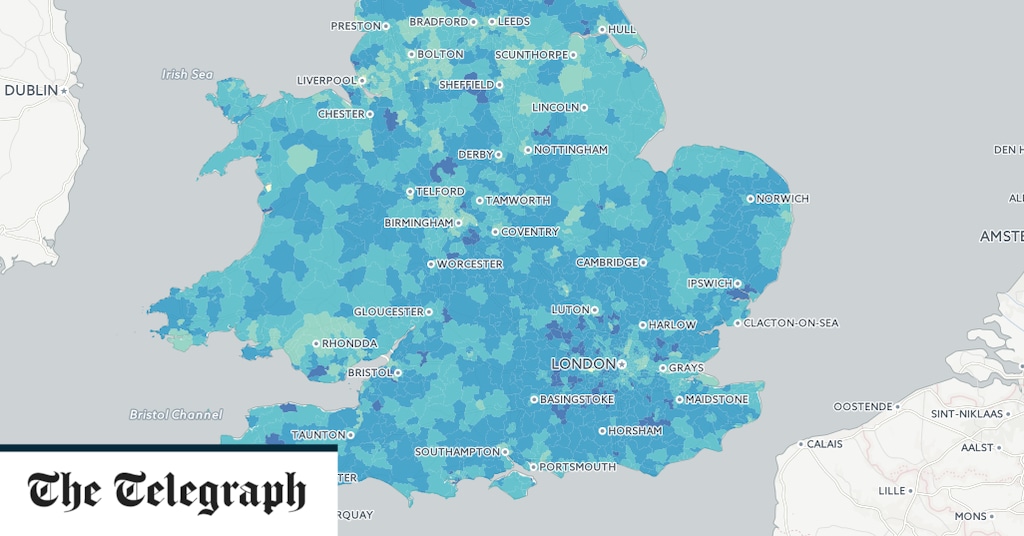Those living in Kingston-Upon-Thames in south west London have the best credit scores in Britain, according to new research.
The data – which looks at credit scores by postcode – suggests that as well as being unlikely to default on their debts, those living in the wealthy suburb are also more likely to be registered on the electoral role.
They may move home less frequently than residents of other areas and may have longer records of paying utility bills on time.
Kingston residents’ score is 15pc higher than the UK’s average.
You can see how your postcode scores in the interactive map below:
The results are based on credit-checking service ClearScore’s scoring system which goes from 0 to 700 – the latter being the highest possible score. (This differs from other companies: for example Experian’s top credit score is 999).
The data comes from the scores of more than 2.5m people.
The best ratings tended to be found in well-off areas, such as Kingston, as well as in rural or remote parts of the country.
Lerwick in the Shetland Islands, for example, and the wealthy commuter town of Guildford were found to among the most "financially fit" postcodes scoring 390.91 and 3.89.95 on average respectively.
At the other end of the scale Sunderland scored the lowest with a rating of 317.67. Residents of Blackpool came close behind with a score of 318.78.
While the top two areas differ population wise – the Office of National Statistics suggested 173,525 people lived in Kingston while there are around 23,200 in the Shetland Islands – according to ClearScore both have lower-than-average "credit utilisation". This is the amount of credit you are given, compared to how much you use.
For example, you might have a credit card spend limit of £3,000 but rarely build up a balance of more than £500. That would be a low "utilisation".
The average utilisation for ClearScore users is 36pc but Kingston and the Shetland Islands residents have levels of 30pc and 29pc respectively.
There are wider issues that will affect residents that could have a knock-on financial impact, such as employment and income.
For example, ClearScore suggested that the Shetlands has an incredibly low unemployment rate – under 1pc. This is much lower than the UK average, which is around 5pc.
Employment is not factored into credit scores per se, however those with steady income may be more able to pay bills on time.
Sunderland has an 8pc unemployment rate – higher than the 7.3pc average of the north east of England.
Who’s checking your score?
Lenders are not the only ones to look at your credit score. Mobile phone providers, banks, car or home insurance companies and utility firms also want to check if you might be a risk. As will landlords.
In some cases a potential employer may also review your credit record, especially if the job involves handling money.
There is no universal scoring system and lenders are secretive about how they use credit file data. Just because one lender rejects you, or offers only a higher rate, doesn’t mean they all will.
Improve your credit score
Simple steps such as making sure you’re registered to vote, paying bills on time and not using too much of your available credit are a good start.
Ensure your address on accounts, such as a mobile phone contract, is up to date.
Don’t withdraw money from ATMs with credit cards ever – even if you lose your debit card. It will look like you are bad at managing money and lenders could view this as risky behaviour.
Private rental tenants can improve their credit rating by paying their landlord through the Rental Exchange scheme. Experian, the credit agency, is notified when the payments are made on time. It’s free to sign up but you must have your landlord’s consent.
If you have a history of bad borrowing there are a number of ways you can improve your score.
Regardless of your credit score it’s always worth speaking to a high street lender in the first instance to see what it can offer you.
If you are rejected for a mainstream mortgage, specialist lenders such as Precise Mortgages and Kensington Mortgages are your next option but the rates will be higher.
The same applies to credit cards.
For example, Tesco Bank offers a Foundation credit card to help borrowers build their credit rating. It charges interest of 27.5pc – far higher than its regular cards which have an APR of 18.9pc.
- Sainsbury’s Bank launches longest ever 0pc credit card deal – but watch out for the 4pc fee
- Best interest-free cards: our favourite balance transfer cards for shifting debt
However specialist providers will offer cards with a higher rate.
Marbles and Aqua both offer cards to those who may have been rejected for credit in the past. The APR of these cards is high – charging 33.8pc and 34.9pc respectively.
See here for more information about credit building cards.
Have a question for our experts? Email moneyexpert@Finance.co.uk. The best of the answers are included in our weekly newsletter
























Comments